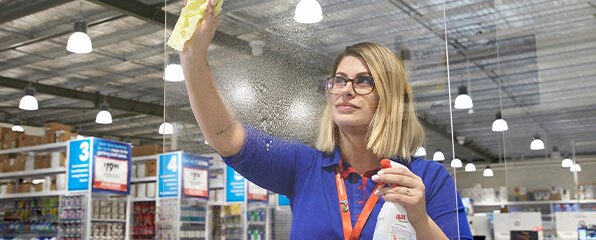
Commitment 13: Become a zero-waste business
What’s the issue?
In a retail environment, producing waste is an inevitable part of doing business. From product packaging to disposing of faulty or broken items, reducing the amount of rubbish that gets sent to landfill takes creative thinking, dedication, and a shared commitment from team members and suppliers to see waste in a new way, and turn rubbish into resources.
What are we doing?
To do our part in tackling the waste problem, we are committed to designing out waste in the first instance, and embracing the values of ‘reduce, reuse, repair and recycle’, whenever and wherever possible. In other words, finding new, innovative ways to give what was once rubbish a second life.
During the year, good progress was made by reducing our landfill waste by 32 per cent and recycling a record 91 per cent of all our operational waste. This was achieved by our ongoing strategic approach to waste management, that includes having a deep understanding of our waste streams, supported with data analytics to identify the most appropriate solutions. We targeted problematic landfill streams including single use pallets by transitioning to reusable pallets, damaged goods such as furniture by sending items to a repair site, and bulky items like polystyrene by implementing a centralised polystyrene recycling program, diverting 14,600 kgs of polystyrene from landfill during the year. These changes not only reduce the amount of waste we send to landfill, but also the physical size of bins our teams use and the associated waste expenses.
Achieving our goal to become a zero-waste business relies on the everyday decisions each of our 8,000 team members make when they dispose of an item. Therefore we continued to invest in behaviour change programs, including launching our ‘Becoming a zero-waste business guide’ that outlined the Four Steps to Less, with all team members completing an online training module aimed at identifying ways to design out waste. Additionally, our store team's recycling performance was integrated into their balanced scorecards as a key performance indicator to encourage consistently higher recycling results.
These initiatives have helped us embed a culture of zero-waste in which team members are empowered to identify and implement innovation solutions. During the year this resulted in trials such as implementing centralised metal recycling collection hubs, changing our default receipt printing settings to on-demand to reduce unnecessary receipt waste, and setting up arts and craft repurpose bins to encourage customers to use offcuts for craft projects.
Focus for FY2022
We will continue to ensure our high standards of waste management are maintained and encourage our team to identify further opportunities to design out waste. We will complete a review of our current recycling streams and ensure all services and corresponding bins are optimised as we continue to work towards our goal of becoming a zero-waste business.
Learn more about another 2025 commitment
Our Team
Our Community
Human Rights
Climate Action
Circular Economy
How are we going so far? Find out in our 2019-2020 report.
Information
- Policies
- Social Media House Rules
- Price Beat Guarantee
- Payment Options
- Express Pay
- Afterpay
- Zip
- Flybuys
- Quality Print Promise
- Our delivery options
- Return Policy
- Product Recalls
- Terms of Use
- PCI FAQs
- Privacy Policy
- Scam Warnings
- Whistleblower Policy
- Gift Card Policy
- Rate & Win Competition Terms & Conditions
- OnePass
- Latitude
- Optus Plans
- Upgrade+
- Officeworks App
- Track your order
- Click & Collect
- Cost per page
- 3D Secure
- Customer Communications
- Talking point
- OW CES 2025 Classroom Calendar


 has the facebook
has the facebook






















